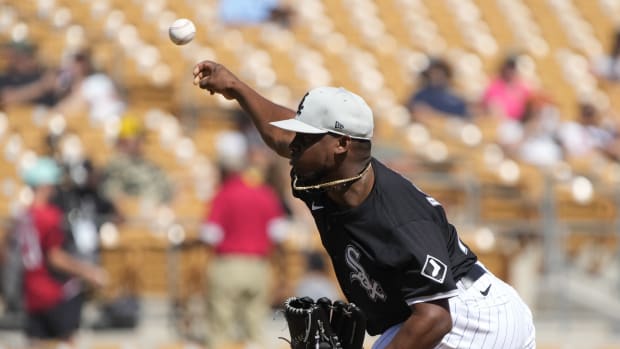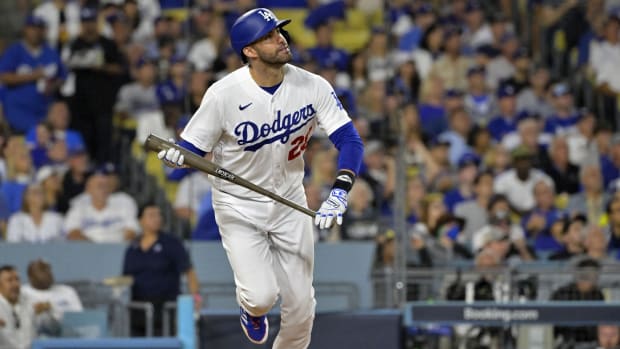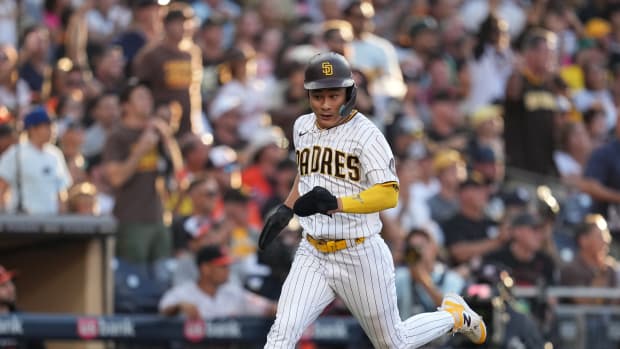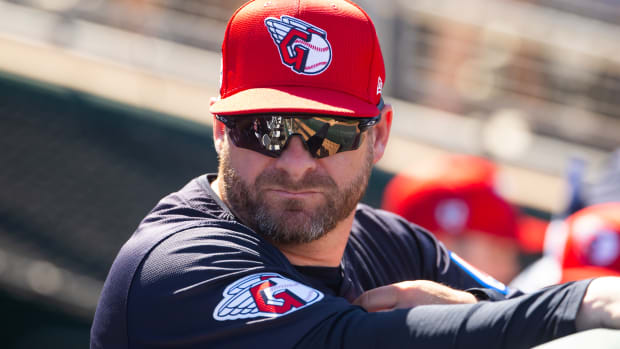The Best Possible Deal for Every National League Team Before the Trade Deadline
The All-Star Game is over, and now the attention turns to this month’s other big baseball event: the July 31 trade deadline. Three weeks stand between now and the last chance for contenders to add help and for rebuilders to move stars for prospects. And while each side has many potential moves they could pull off, which is the one deal that makes the most sense for each? Here’s a quick look at the ideal trade for the 15 National League teams, whether they're getting ready for October or planning for the future. You can find our look at the best deal for the 15 AL teams here.
Arizona Diamondbacks (46–45, second place in NL West; 1.5 GB of second NL wild card) — Trade for Royals RHP Ian Kennedy
In the thick of the NL wild-card mix, Arizona’s biggest area of need is the bullpen. But with the Diamondbacks unlikely to spend much in terms of prospects or target a player on a big contract, it’s hard to find a match. A heavily subsidized Kennedy could be the answer. He’s owed $16.5 million next year, but if Kansas City eats the majority of that, there might be a match. As for what Arizona can make available to a contender if things go south, it can offer veteran catching help in Alex Avila; outfield depth in Adam Jones and Jarrod Dyson; and a closer (albeit a middle-tier option) in Greg Holland. The true prize, though, might be lefty Andrew Chafin, one of the best specalists in the game.
Atlanta Braves (54–37, first place in NL East) — Trade for Giants LHP Madison Bumgarner and RHP Mark Melancon
For as badly as Atlanta could use relief help or another outfielder to take over for the declining Nick Markakis in right, the rotation—projected to be one of the team’s strengths this offseason—has become a major issue. Even with Dallas Keuchel in the fold, Atlanta is still thin. Mike Foltynewicz fell apart so badly that he had to be demoted to Triple A, and youngsters Mike Soroka and Max Fried have to contend with possible innings limits and fatigue. Plus, the Braves face the prospect of an October without an established ace. Enter Bumgarner, a proven postseason hero who can also go deep into games to spare the bullpen. As a rental, he shouldn’t be too costly when it comes to prospects, and Atlanta has so many of those anyway that it can easily outbid most other teams. Taking Melancon—who’s owed $14 million next season—off the Giants’ hands could lower the prospect cost even further and add some needed bullpen depth.
Chicago Cubs (47–43, first place in NL Central) — Trade for Orioles 2B/SS Jonathan Villar
Chicago’s biggest hole is at second base, where Ben Zobrist’s absence has yet to be adequately filled. The Cubs could turn to David Bote as a full-timer (why they haven’t already is honestly a mystery) or keep trying to get something out of Addison Russell and Daniel Descalso. Better would be a proven veteran like Villar, who offers passable defense at two positions, solid hitting and good speed. Installing him as a regular would also free up Bote and Descalso for utility roles for which they’re better suited.
Cincinnati Reds (41–46, fifth place in NL Central; 4.5 GB of second NL wild-card) — Trade for Blue Jays SS Freddy Galvis
Cincinnati may be in last place in its division, but it’s not by much—just 4 ½ games out of first. And while the Reds are below .500, their Pythagorean record puts them at 47–40, which would be the second-best record in the NL. The math, in other words, suggests they may be buyers. If so, they can snag an easy upgrade on a problem position by adding Galvis, a well-traveled veteran. He’s not nearly the defender that incumbent Jose Iglesias is (to be fair, most aren’t), but he’s a far more capable hitter, with a .270/.309/.467 line and 107 OPS+ compared to Iglesias’ .282/.315/.390 and 80. If Cincinnati decides to sell, though, it can shake up the market in a big way by putting Yasiel Puig on the market. He’d make a lot of sense for the A’s or Indians.
Colorado Rockies (44–45, fourth place in NL West; 2.5 GB of second NL wild card) — Trade for White Sox 1B Jose Abreu
Like virtually every other NL team, the Rockies are in a tangled pile of clubs vying for a wild-card spot. Colorado is one of the weaker contenders in that group, though, sitting below .500 and losers of six in a row heading into the All-Star break. One way to turn that skid around would be an upgrade at first base over the aging Daniel Murphy, and the easiest way to do that would be a mega-deal for Abreu, who would instantly upgrade the Rockies’ lineup. That’s an unlikely move, though, and more plausible is Colorado falling further out of the race and selling, perhaps getting rid of some middle relief options in Jake McGee and Bryan Shaw.
Los Angeles Dodgers (60–32, first place in NL West) — Trade for Tigers RHP Shane Greene
The best team in baseball doesn’t have much in the way of holes, though another reliever is likely atop the front office’s wish list. Kenley Jansen looks human, the cast behind Pedro Baez is less than inspiring, and Rich Hill’s injury has forced Dave Roberts to move Ross Stripling—a valuable relief option—into the rotation. Amid a career year, Greene won’t come cheap, especially with a year of team control beyond 2019. He’s also vastly outperforming his peripherals. But he avoids hard contact and gets lots of groundballs, and more importantly, he won’t displace Jansen in the ninth. As a setup man, the Dodgers could do a lot worse.
Miami Marlins (33–55, fifth place in NL East) — Trade RHP Sergio Romo
Miami has some veterans who could work as bench pieces in Neil Walker, Curtis Granderson and Starlin Castro, but it’s Romo who likely has the most value as a still-effective bullpen arm against righthanded hitters. The Rays, Red Sox, Twins, Braves, Nationals, Phillies, Brewers, Dodgers and Diamondbacks are all in the market for that.
Milwaukee Brewers (47–44, second place in NL Central; 0.5 GB of second NL wild card) — Trade for White Sox RHP Alex Colome
Milwaukee’s rotation is far from the strongest, yet the odds of the Brewers landing a top-flight starter feel low. More likely is a move to bolster a bullpen that’s light on impact arms. Aside from Josh Hader, no one else has stepped up, and former closer Jeremy Jeffress hasn’t found his 2018 form. Colome’s peripherals aren’t exactly awe-inspiring—just 27 strikeouts in 35 2/3 innings—but he’s a solid arm and seemingly tireless; 13 of his 36 appearances have come on one or zero days’ rest.
New York Mets (40–50, fourth place in NL East) — Trade RHP Zack Wheeler
With New York in freefall, it’s time to sell, and Wheeler—who will be a free agent this winter—is the most valuable piece the Mets have to offer. The Yankees, Twins, Red Sox, Angels, Braves, Phillies and Brewers all have rotation openings and would pay dearly for someone with Wheeler’s upside. Aside from Wheeler, new GM Brodie Van Wagenen could try to deal away veterans Wilson Ramos and Todd Frazier.
Philadelphia Phillies (47–43, third place in NL East; second NL wild card) — Trade for Blue Jays RHP Ken Giles
A bullpen that’s been torn apart by injuries needs reinforcements in the worst way, especially with Philadelphia slipping further and further behind both the Braves and the resurgent Nationals. Giles would help stop the bleeding in a big way. The former Phillies closer has rebounded from a shaky 2018, striking out 53 in 31 innings against just nine walks and five runs allowed. The cost would be high, but the Phillies can’t balk.
Pittsburgh Pirates (44–45, fourth place in NL Central; 2.5 GB of second NL wild card) — Trade for Padres OF Hunter Renfroe
The Pirates are unexpectedly in the NL Central race, though that has more to do with the inability of any one team to run away with it than anything else. The underlying stats don’t think much of Pittsburgh, and it’s hard to see the team somehow climbing into first place. So if the Pirates do buy, it’ll probably be cheaper options to patch roster holes. If they do want to go for it, though, Renfroe would make a ton of sense for a roster that, aside from Josh Bell, is devoid of power (assuming San Diego is a seller). If Pittsburgh sells, meanwhile, look for the front office to move veteran starter Jordan Lyles and lefty reliever Francisco Liriano, who could help at the back of the rotation or in the bullpen for a contender shopping on the cheap.
St. Louis Cardinals (44–44, third place in NL Central; 2 GB of second NL wild card) — Trade for Orioles RHP Andrew Cashner
Stuck at .500, the Cardinals are nonetheless still alive in the NL Central, though they’d be in better shape with anything approaching better starting pitching. Aside from Dakota Hudson, the rest of the rotation has been mediocre to bad. Cashner is no one’s idea of an ace, but he’s been quietly excellent in Baltimore, with a 3.83 ERA and 120 ERA+ in 96 1/3 innings. His strikeout rate is a measly 16.5%, but that doesn’t matter as much when he’s getting as many groundballs as he is and avoiding homers and walks.
San Diego Padres (45–45, third place in NL West; 2 GB of NL wild card) — Trade for Tigers LHP Matthew Boyd
To close out the first half, the Padres got swept by the Giants at home and then swept the Dodgers in Los Angeles. In other words, your guess is as good as mine as to whether or not this team is a contender. At .500 and only two games out of a wild-card spot, though, San Diego could defend buying. If so, starting pitching is a big need. With its wealth of prospects, the Padres can outbid almost anyone for whomever they want. Someone young, cheap and cost-controlled would be the ideal target, though, and that means Boyd, who’s put together a breakout year in Detroit but is still just 28, only making $2.6 million this year, and won’t be a free agent until 2023. On the flip side, if the Padres sell, Hunter Renfroe would be of interest to anyone looking for power, and they could rule the relief market if they choose to move All-Star closer Kirby Yates.
San Francisco Giants (41–48, fifth place in NL West) — Trade LHP Madison Bumgarner
The Giants have arguably the best rental available on the market in Bumgarner, who would be a terrific fit for a team that needs rotation depth and someone with postseason experience. The Yankees, Twins, Red Sox, Angels, Braves, Phillies and Brewers all make sense for him. San Francisco has relievers to offer as well, including Will Smith, Tony Watson, Sam Dyson and Mark Melancon.
Washington Nationals (47–42, second place in NL East; first NL wild card) — Trade for Giants LHP Will Smith and RHP Sam Dyson
The surging Nationals have been baseball’s best team over the last month, going 22–9 since June 1. Still, even as they’ve climbed back into the NL East and wild-card races, they need bullpen help, as the relief corps is still shaky. Smith has both closer and setup experience and is a massive upgrade on current Washington lefties Tony Sipp (4.41 ERA and Matt Grace (5.94). He’s the high-leverage reliever of Davey Martinez’s dreams. The Nats need more than one extra reliever, though, so I’ll make this a package deal and include Dyson, who has been a late-innings rock in San Francisco and is one of the league’s premier ground-ball specialists.



































